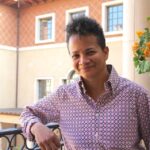Film Theory and Visual Culture Seminar
The Film Theory and Visual Culture Seminar fosters dialogue among faculty and graduate students interested in film, visual culture, art history, literature and media studies, as well as in theories of the image, philosophies of perception, aesthetics and critical theory, media histories, and the history of vision. Each semester we host scholars, media-makers, and artists from leading film and media programs (and adjacent fields), as well as scholars from our own Vanderbilt community. See our line-up of speakers below and please join us for the conversation! To see a list of previous speakers, please click here.
Sign up for the Film Theory and Visual Culture mailing list.
Spotlight Seminars

Claire Sisco King (Communication Studies/Cinema & Media Arts)
“Mapping the Stars: A Conversation with Claire Sisco King.”
Friday, September 15, 2 PM, RPW Center*
Abstract: Claire Sisco King discusses her new book Mapping the Stars: Celebrity, Metonymy, and the Networked Politics of Identity (Ohio State University Press, 2023) with Lutz Koepnick (Vanderbilt University. Often dismissed as trivial or even “trash,” celebrity culture offers a unique way of considering what it means to be human. In Mapping the Stars, Claire Sisco King shows how close analysis of the complex and sometimes contradictory forms of celebrity culture can challenge dominant ideas about selfhood. In particular, as a formation that develops across time, mediums, and texts, celebrity is useful for demonstrating how humanness is defined by relationality, contingency, and even vulnerability. King considers three stars with popular and controversial personas: Norman Rockwell, Will Smith, and Kim Kardashian. Working in very different contexts and with very different public images, these figures nonetheless share a consistent, if not conspicuous, interest in celebrity as a construct. Offering intertextual readings of their public images across such sites as movie posters, magazines, cinema, and social media—and deploying rhetorical theories of metonymy (a linguistic device linking signifiers by shared associations)—King argues that these stars’ self-reflexive attention to the processes by which celebrity is created and constrained creates opportunities for reframing public discourse about what it means to be famous and what it means to be a person.Bio: Claire Sisco King is Associate Professor of Communication Studies and Cinema & Media Arts at Vanderbilt University and Chair of the Department of Cinema & Media Arts.
*Thursday, September 14th. In conjunction with the Friday talk, Claire King presents Hancock (Berg, 2008) at International Lens film series at Sarratt Cinema at 7:30 p.m. Free and open to the public.

Shonni Enelow (Fordham University)
“Absorption and the Films of Joanna Hogg”
Friday, October 27, 2:30PM, RPW Center*
Abstract: This talk explores the films of Joanna Hogg through the concept of absorption. First theorized by art historian Michael Fried to describe the modernity of eighteenth-century French paintings in which figures turn away from the beholder and towards a diegetic scene, absorption is one way artists assert their works’ self-sufficiency and separateness. I read Hogg’s films The Souvenir and The Souvenir Part II, which center on an eighteenth-century painting by Jean-Honoré Fragonard, as a meditation on absorption, drawing from both Fried and psychoanalytic theorist Joan Copjec, who takes absorption as an aesthetic demonstration of love. Hogg’s films use the indirection of absorption to draw the viewer into a relation of attachment and at the same time to maintain their alterity. They both diegetically represent, in their characters, and formally enact, in their presentation to the viewer, absorbed relations of mysterious and inexplicable attachment. This talk focuses in particular on the final sequences of the Souvenir films, in which the absorbed relation between the filmmaker and her artwork enters the scene.
Bio: Shonni Enelow is Professor of English at Fordham University and the author of Method Acting and Its Discontents: On American Psycho-Drama (Northwestern University Press, 2015), which won the George Jean Nathan Award for Dramatic Criticism. Her scholarship has appeared in Modern Drama, Theater, Theatre Survey, and Theatre Topics; her article “Sweating Tennessee Williams” won the Modern Drama Prize in 2019. She writes regularly for Reverse Shot and has also written for Film Comment, MUBI Notebook, and for the Criterion Collection. Her book with visual artist David Levine, A Discourse on Method, was published by 53rd State Press in 2020. Her monograph on the filmmaker Joanna Hogg will be published by the University of Illinois Press in 2024.
*On Thursday, October 26th, Enelow will present The Souvenir (Hogg, 2019) at the International Lens film series at Sarratt Cinema at 7:30 p.m. Free and open to the public.

Kara Keeling (University of Southern California)
“‘Marvels of … Inventiveness”: On Aesthetics and Governance.”‘
Friday, December 1, 2 PM, RPW Center
Bio: Kara Keeling is Professor of Cinema and Media Studies and American Studies and Ethnicity at the University of Southern California. Keeling is author of Queer Times, Black Futures (New York University Press, 2019) and The Witch’s Flight: The Cinematic, the Black Femme, and the Image of Common Sense(Duke University Press, 2007) and coeditor (with Josh Kun) of a selection of writings about sound and American Studies entitled Sound Clash: Listening to American Studies (Johns Hopkins University Press, 2012), and (with Colin MacCabe and Cornel West) a selection of writings by the late James A. Snead entitled European Pedigrees/African Contagions: Racist Traces and Other Writing (Palgrave Macmillan, 2003).

Ekiem Barbier (Composer and filmmaker)
“Virtually Non-Fiction: Filmmaking in digital worlds and the making of Knit’s Island”
Wednesday, March 20, 4:30 PM, Buttrick Hall, Room 103
Bio: Ekiem Barbier is a composer and filmmaker, currently based in Marseille. He studied drawing and video at the Montpellier Fine Arts school. Knit’s Island, his most recent film (co-directed with Guilhem Causse, and Quentin L’helgoualc’h) premiered at Visions du Réel, where it won both the Burning Light Jury Prize and the FIPRESCI Prize for best film. It has gone on to play at such venues as IDFA, Camden, and the Museum of the Moving Image in New York. (Knit’s Island will be playing at iLens on Thursday, March 21st, at 7:30PM. You can watch a trailer here.)